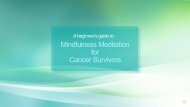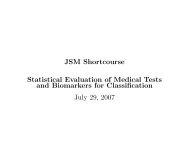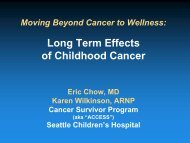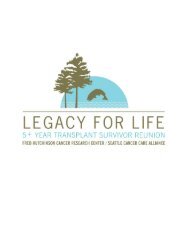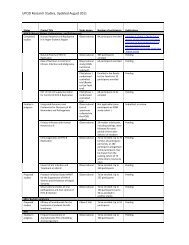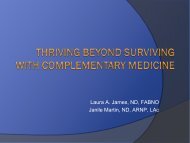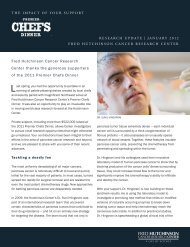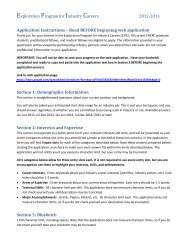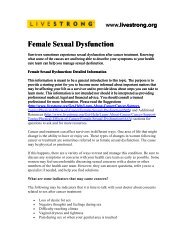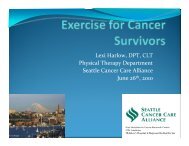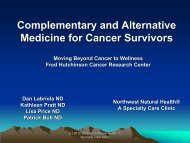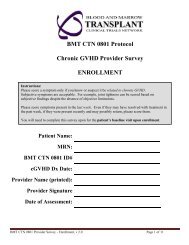Summer Undergraduate Research Program - Fred Hutchinson ...
Summer Undergraduate Research Program - Fred Hutchinson ...
Summer Undergraduate Research Program - Fred Hutchinson ...
You also want an ePaper? Increase the reach of your titles
YUMPU automatically turns print PDFs into web optimized ePapers that Google loves.
MD/PhD Personal Statement Examples<br />
MD/PhD Personal Statement #1<br />
MD/PhD Example Personal Statement #1<br />
Raised on ten acres of open land in XXX, XX, I spent much of my youth exploring the<br />
woods and building forts in the ponderosa pines with my twin sister. I was healthy, energetic and<br />
conscious of my body in relation to nature. Just as I learned to recognize the environmental<br />
changes that are inherent with the cycle of seasons, I developed an intrinsic awareness of my<br />
personal wellbeing.<br />
This awareness may have saved my life. When I was eleven, I noticed my vision blurring<br />
and I developed a constant feeling of fatigue, thirst, and hunger. I recalled learning about<br />
diabetes in a science class and made a tentative connection between my symptoms and the<br />
disease. I was eventually diagnosed with Type I diabetes. Two months later, I was diagnosed<br />
with Celiac disease and began a strict gluten-free diet to prevent possible long-term<br />
complications, including nutrient deficiencies and cancers. Before I had finished my first year of<br />
middle school, I was responsible for monitoring my blood sugars, carbohydrate intake, exercise,<br />
and insulin requirements in order to establish a sustainable quality of life.<br />
After my diagnosis, I discovered almost immediately that there is no owner's manual for<br />
the human body. Controlling my blood sugar requires experimentation, evaluation, and analysis,<br />
all in real time, without the controls of a laboratory. In the absence of formal instruction, I have<br />
to determine how to optimize the way my body feels and functions through an exhaustive<br />
process of trial and error.<br />
I started running recreationally the year after my diagnoses. What began as a way to<br />
spend time with my family and enjoy the XX of XX became a mental and physical outlet. I do<br />
not let my autoimmune disorders prevent me from being an athlete. I have competed in crosscountry,<br />
swimming, track and field, mountain ascents, winter and summer triathlons, snowshoe<br />
races, and cross-country ski races, including two ski marathons. Today, I am captain of the XX’s<br />
XXX club team at XX University.<br />
Like two creeks that merge into a river, the challenges of having diabetes and being an<br />
athlete have run together to dominate my stream of consciousness. Every day I test my blood<br />
sugar and every day I train. Both endeavors absorb every ounce of effort that I put in and offer<br />
small rewards in return; these minuscule accomplishments can only be celebrated on the most<br />
personal level. Setbacks are unavoidable, which require redirecting my analysis and focus in<br />
order to get it right next time, tomorrow, next year. To be a diabetic athlete is a unique challenge;<br />
consequently, I review research literature about diabetes, endocrinology, metabolism, exercise<br />
science, and nutrition to better understand my body and optimize my athletic performance.<br />
The maintenance that my body demands drew me to Professor XX XXX’s laboratory at<br />
XX University. Dr. XXX’s research focuses on using techniques in inorganic chemistry and<br />
biology to orally deliver proteins, such as insulin, as well as target tumors for the early detection<br />
of cancer. The attributes that have helped me improve my diabetes control -- curiosity,<br />
organization, and persistence -- have also proven beneficial in the lab. Measuring and evaluating<br />
my blood sugars and adjusting my insulin have proven applicable to projects that require my<br />
ability to critically analyze data, isolate variables, and identify meaningful patterns.<br />
Over time, my zest for science grew beyond learning the laboratory techniques and into a<br />
desire to apply those insights into tangible implications for human health. I realized that my<br />
desire to interact at the human level would not be satisfied by a career rooted solely in the lab. I<br />
satisfied this drive by immersing myself in a clinical setting where I could interact with patients.<br />
In XX, I spend Sunday mornings on the recreational therapy floor at the XX Medical Center,<br />
51



